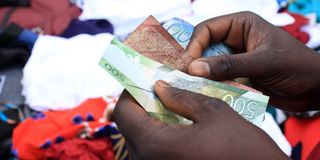
A man counts money made from second-hand clothes' sales at the Gikomba market. A report by the World Bank says the Covid-19 pandemic has led to massive job losses and weakened supply chains.
What you need to know:
- It says the pandemic, coupled with locust swarms, which mainly ravaged eastern Africa countries has led to reduced agricultural productivity, massive job losses and weakened supply chains.
- The bank says sub-Saharan Africa is set to face its first recession in 25 years and will experience a negative economic growth of between 2.1 and 5.1 percent this year while agricultural productivity will fall by between 2.6 to seven percent.
- Data from the Kenya National Bureau of Statistics (KNBS) shows more than 1.7 million Kenyans lost their jobs between April and June at the onset of the pandemic.
- Small and medium-sized businesses, which account for a majority of total jobs in the market, have appealed to the government to be advanced with financing to reopen their businesses.
Covid-19 will push 100 million more people into extreme poverty by next year with sub-Saharan Africa set to be the hardest hit, a report by the World Bank says.
It says the pandemic, coupled with locust swarms, which mainly ravaged eastern Africa countries has led to reduced agricultural productivity, massive job losses and weakened supply chains.
This is estimated to have cost the region between Sh4 trillion to Sh8.5 trillion in productivity this year alone.
While people living in extreme poverty have been reducing over the past few decades from 1.9 billion in 1990 to 689 million in 2017, it is set to be the first time that the numbers will jump since World Bank started collecting the figures.
"Global extreme poverty is expected to rise in 2020 for the first time in over 20 years as the disruption of the Covid-19 pandemic compounds the forces of conflict and climate change, which were already slowing poverty reduction progress," the report says.
Massive job losses
The bank says sub-Saharan Africa is set to face its first recession in 25 years and will experience a negative economic growth of between 2.1 and 5.1 percent this year while agricultural productivity will fall by between 2.6 to seven percent.
This will not only lead to a food crisis but will see millions of people lose their sources of livelihoods which has already increased Kenya’s unemployment rate to 10.4 percent.
Data from the Kenya National Bureau of Statistics (KNBS) shows more than 1.7 million Kenyans lost their jobs between April and June at the onset of the pandemic.
While rural areas have over the years accounted for a majority of poor people in the country, the report by World Bank many new entrants into extreme poverty to be in urban areas who will be the most affected by loss of income.
Some of the most affected sectors include tourism and hospitality which saw massive job losses as international travel was halted by countries across the world.
Reduced loans
Entertainment and events industry saw thousands lose their income sources as lockdowns and the long-running dusk to dawn curfew meant leisure joints remained shut.
However, despite some of the containment measures against the pandemic being gradually eased, many businesses are struggling to get back into business.
Small and medium-sized businesses, which account for a majority of total jobs in the market, have appealed to the government to be advanced with financing to reopen their businesses.
However, banks have reduced loans to individuals and businesses amid a record-breaking rise in non-performing loans this year.
bambani@ke.nationmedia.com




No comments :
Post a Comment